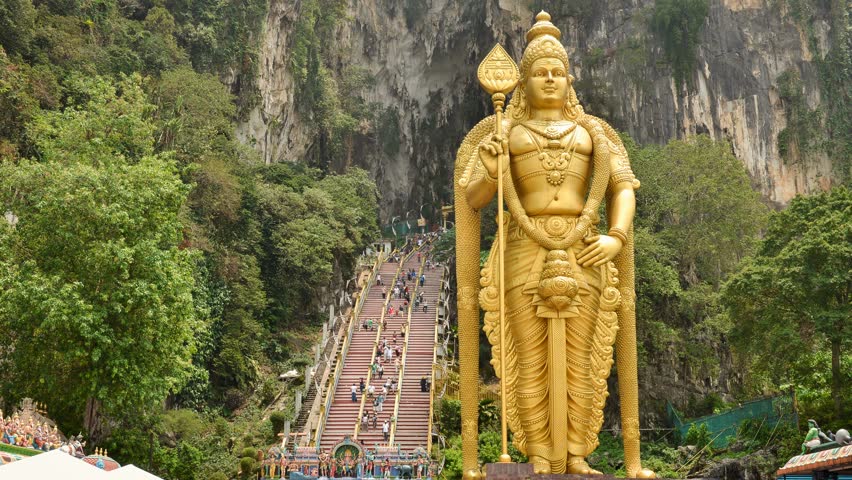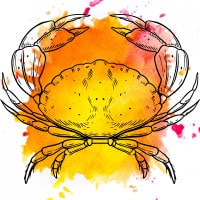In Tamil, ‘Thai’ refers to a month that corresponds to January- February, while ‘Poosam’ refers to the Poosam/Pushya Nakshatram (star). Thai Poosam is a festival observed by Hindus in south India on the full moon day of the month of Thai. It is also celebrated by the Tamil diaspora residing in countries like Sri Lanka, Malaysia, Singapore, South Africa, etc.
Thai Poosam honors the patron god of Tamils, Lord Murugan. He is the son of Shiva and Parvati. Murugan has many other names like Karttikeya, Subrahmanya, Sanmukha, Shadanana, and Skanda.
On this day, Goddess Parvati is believed to have presented a Vel or lance to Murugan to defeat the demon, Tarakasura, and his brothers. Like many other Hindu festivals, Thaipusam celebrates the triumph of good over evil.
On this occasion, devotees pierce their body with metal skewers and carry a kavadi (a yoke-like structure made of wood or bamboo, covered with cloth and decorated with peacock feathers) on their shoulders to Murugan temples. This is done to fulfill their vows and express gratitude when their wishes are granted. Many also carry milk pots on their heads and go in a procession to Muruga temples, where they offer the milk to Muruga.
How to Celebrate Thai Poosam
On Thai Poosam, devotees offer yellow or orange-colored fruits and flowers to the deity and also wear clothes in these colors, as they are Muruga’s favorite colors. They also carry fruits, milk, water, and flowers on pails hung from Kavadis to Murugan temples.

Thai Poosam in Southeast Asia
Thai Poosam is celebrated by Tamils in Malaysia and Singapore with great fervor. The renowned Kavadi pilgrimage takes place at the Batu Caves in Malaysia on Thai Poosam. Hordes of devotees go in procession to the Murugan temple here carrying Kavadi to gain the blessings of Lord Murugan for good health, happiness, and prosperity.
The Legend Behind Thai Poosam
There is a story behind Thai Poosam. According to the Skanda Purana, an Asura (demon) called Soorapadman became very powerful and began to harass the Devas (gods), along with his brothers. The gods approached Lord Shiva for help and beseeched him to save the universe from the demons. Only a son born to Shiva could kill the demons. This was the purpose of Muruga’s birth.
Goddess Parvati, the consort of Shiva and Murugan’s mother, gifted a Vel or lance to her son. This divine weapon had the power to destroy evil. Murugan, as commander-in-chief of the gods, led the battle against Soorapadman. The Vel helped him kill the demons and achieve victory over them. Devotees celebrate this day as Thai Poosam.
Thai Poosam Rituals
Devotees start preparing for Thai Poosam weeks in advance. They prepare their mind and body by praying and fasting a week before the festival. On Thai Poosam, they perform acts of penance, including carrying a ‘Kavadi,’ piercing themselves with skewers that pass through their tongues, cheeks, and bodies, walking on burning coals, etc. The belief is that these acts of penance will cleanse their sins and bring Muruga’s blessings for wealth, health, and happiness. Some perform them as an act of thanksgiving and to fulfill their vows when their wishes are granted.
Thai Poosam festival is celebrated grandly in temples dedicated to Muruga/Subramanya. The highlight of the festival is a dance called “Kavadi Attam”. There are two myths about this dance. One says that this is the dance performed by Muruga’s servants to encourage him to start the war with Soorapadman, as he had the divine Vel with him. According to this story, “Kavu” means a temple or divine place, and “Adi” denotes ‘servants’.
In Kavadiattam, the dancers carry an arch-like structure adorned with flowers. Dancers keep it on their shoulders and dance to the sound of drums. Other versions claim that Kavadi means ‘burden’, and the dancers carry their burdens on their shoulders and dance to please Muruga.
The dancers need to follow certain rituals before taking part in the Kavadi attam. They must observe penance for 41 days by avoiding alcohol, non-vegetarian food, etc. The belief is that Muruga will enjoy their dance and take away the burdens from their shoulders.

